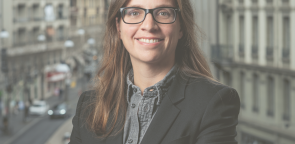
For many victims of sexual abuse, recognition from the courts is an essential step towards rebuilding their lives. Lausanne-based lawyer Coralie Devaud blames Switzerland’s archaic laws on rape and incest.
coralie devaud Sexual abuse committed against children is always prosecuted. That means that a complaint does not need to be filed to initiate criminal proceedings. However, it is advised to press charges to protect your rights. Most reports that a minor is in danger come from the school, family or a medical institution. However, if the child is deemed capable of discernment, around age 15, they can also lodge a complaint themselves.
Legal proceedings are then set in motion and an investigation begins shortly thereafter. Depending on the perpetrator’s age, the case is brought before either the Juvenile Court or the Public Ministry if the person is a legal adult.
cd The hearing process follows a very specific procedure when it comes to children. If the child is deemed eligible, i.e. from the age of 5 or 6, they are interviewed and filmed in a specially adapted room, in the presence a LAVI psychologist, following a protocol defined to avoid influencing or tainting the victim’s statements. Specially trained inspectors follow the hearing from another room via video. We listen carefully to what the child says spontaneously. All necessary steps are taken to avoid tainting what they’re saying, which could lead to secondary victimisation1.
cd The prosecutor contacts the Justice of the Peace – the judge in charge of child protection – to assign a representative or guardian for the child who can defend the child’s interests in the proceedings. In other words, the parents lose their legal authority to represent their child in this capacity. The Direction générale de l’enfance et de la jeunesse (General Directorate for youth and children or DGEJ) can also intervene in civil matters. For example, it can request that the child be placed outside the home if the child is not deemed safe with their parents or legal guardians.
cd That’s right. Under the Swiss Criminal Code, incest is an infraction under family law. This was originally intended to prevent consanguinity and protect family ties. Incest must involve coercion or violence to be considered a crime. Like the definition of rape in Switzerland, the provision defining incest is archaic: there must be a sexual act between ascendants and descendants or between brother and sister. The perpetrator of incest can only be male and the victim female. Incestuous relationships between a mother and son or between a father and son do not fall within the definition of incest, nor does the abuse committed by an adoptive brother or stepfather, since the Criminal Code only recognises only a blood relationship.
cd The definition of rape is currently very restrictive. It is based on the notion of physical or psychological coercion. Legally, if a “no” is expressed verbally without any other means of coercion, it is not considered rape. Cognitive inferiority or emotional and social dependence, especially with children and adolescents, can cause tremendous pressure, making them incapable of opposing sexual abuse. We often need to point out that a child never consents, and that sexual assault can take place without coercion. Furthermore, rape, like incest, is only recognised as such in cases where the penis penetrates the vagina, which excludes oral and anal sex and automatically sexual assaults between people of the same gender.
cd Yes, that’s the problem with these proceedings. Victims feel they have to prove that they are telling the truth. Perpetrators rarely admit any wrongdoing, unless there is clear evidence such as forensics or a grandfather who took photographs of his granddaughter’s genitals. Even in these cases, abusers and their spouses sometimes lock themselves up in denial. Legal authorities work closely with medical professionals, who can for example confirm a state of post-traumatic stress. This is an additional argument for the court, as doubt always plays in favour of the accused. The case of a sexual abuse victim can easily fall apart and taking it all the way to court is a long, drawn-out process.
iv What can the Swiss justice system do for victims?
cd We often hear that victims feel abandoned, that the whole legal process revolves around the accused. But not all survivors turn to the justice system for the same reason. Some need the facts to be recognised to achieve closure and rebuild their lives. Others need a conviction. Then others initiate legal proceedings to prevent the abuse from happening again. /
After graduating with a degree in law, Lausanne native Coralie Devaud continued her academic career with a PhD dissertation on the informed consent of patients. She has been practising criminal law for more than 10 years, defending the interests of children who have suffered physical, psychological or sexual violence. Coralie Devaud also advises and assists healthcare professionals in criminal and disciplinary proceedings.